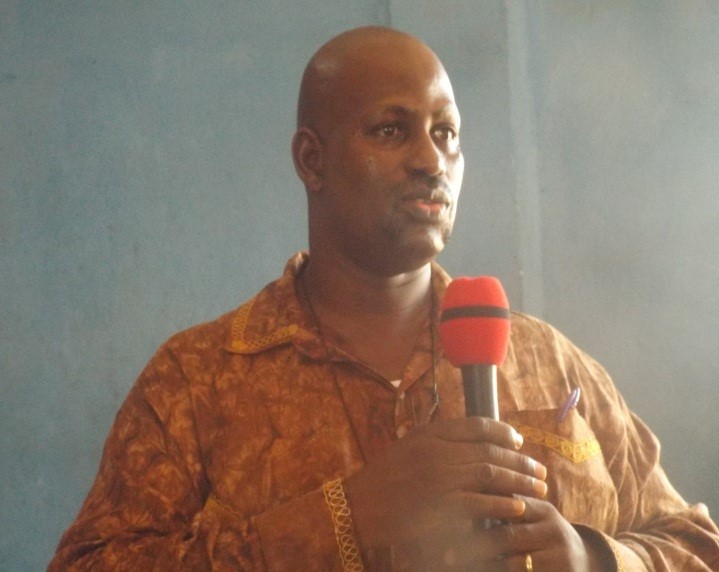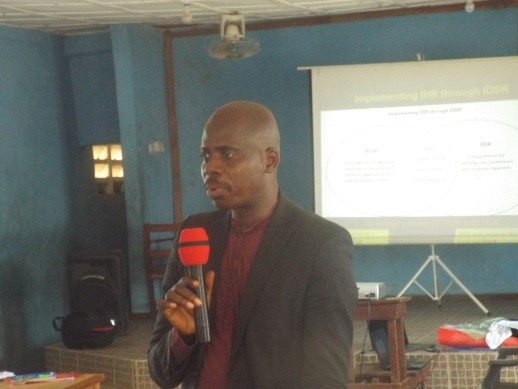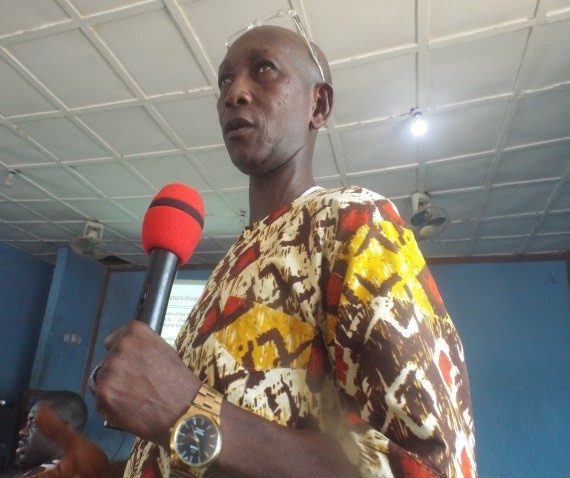MOHS Trains Journalists on Reporting Health in Bo City
The Ministry of Health and Sanitation [MOHS] with support from Radese under the Directorate of Health Security and Emergency [DHSE] has successfully concluded two days training for forty [40] Journalists comprising reporters and columnists on reporting health. (Photo: Communication Lead, DHSE )
The well-attended training program which drew participants from East, South and part of Western Area was held at Bishop Gbondor Resource Centre, Damballa Road, Bo City on the 17th and 18th May 2019 respectively.
Presenting on the use and interpretation of data, the Communication Lead, DHSE, Harold Thomas emphasized on the important for reporters and columnists to make use of data in presenting their stories adding that, it is enough to access and report numerical information about illness, death and disability.
He spoke on the interpreting data at the level of collection to provide information to the public to take relevant, timely and appropriate public health action.
He said the learning objective was not only to understand how to interpret health data or understand the use of tables, graphs and hectographs in trend analysis but also to understand the use of maps to analyze location of population at risk and understand the use of tables to describe characteristics of affected population and mentioned that data also identify the cause of problem and monitor progress of public health program.
He maintained that health data reporting is a critical aspect for health reporters and columnists and spoke on the several available methods for reporting health data depending on the information the Journalist is trying to present. He encouraged reporters and columnists to summarize their information after obtaining health data.
The Program Manager, Public Health Emergency Management Program, Mukeh Kenneth Fambulleh who highlighted on road traffic accident said according to road traffic accident data published in 2007 by the World Health Organization [WHO], road traffic accident data in Sierra Leone revealed 1, 842 or 2.25% of total deaths.
Presenting on the Integrated Disease Surveillance and Response [IDSR], the Deputy Program Manager, National Disease Surveillance Program, Mr. Joseph Sam Kanu said it involves carrying out disease surveillance activities using an integrated approach.
Mukeh Kenneth Fahnbulleh
Joseph Sam Kanu
He described an integrated approach as data on all important diseases are collected, analyzed, interpreted and reported in the same way by the same people who normally who normally submit routine report forms on health related data. He said collecting, analyzing and reporting priority diseases in this way have several advantages. Firstly, he said, it provides training and capacity building opportunity for health personnel to develop new skills, encourages community participation to detect and response to disease epidemics. He said the IDSR strategy adapted by member states in 1998 with the goal to improve the ability of all levels of health system. He dilated that public health surveillance detect sudden changes in disease in disease occurrence and distribution.
He continued that some of the objectives of IDSR comprised strengthen capacity for effective surveillance, interpret disease surveillance systems for efficacy and improve use of surveillance information.
Speaking on behalf of the Ministry of Agriculture Forestry and Food Security, Mr. Conteh said MAFFS is the lead Government agency to provide enabling environment to propel growth and national development and further discussed that the livestock and veterinary service division is charged with the responsibility to promote animal health and production services so as to improve on the availability of animal resources.
The Office of National Security [ONS] representative reiterated that they have the sole aim of coordinating all emergencies and emphasized that when an emergency hits, ONS plays a leading role in coordinating and mobilizing resources to respond to it.
He said the national security and central intelligence Act 2002 section five [5] subsection 18 empowers ONS as the primary coordinator of national emergencies. He discussed that camp coordination depends on the scale of the emergency and sensitized that the leadership of the camp is provided by ONS and NaCSA. He said women, children, disabled and the aged are mostly vulnerable to disaster and disclosed that there is always centralized response effort by both the Government of Sierra Leone and partners.
By Abdulai Mento Kamara
Stay with Sierra Express Media, for our trusted place in news!
© 2019, https:. All rights reserved.











